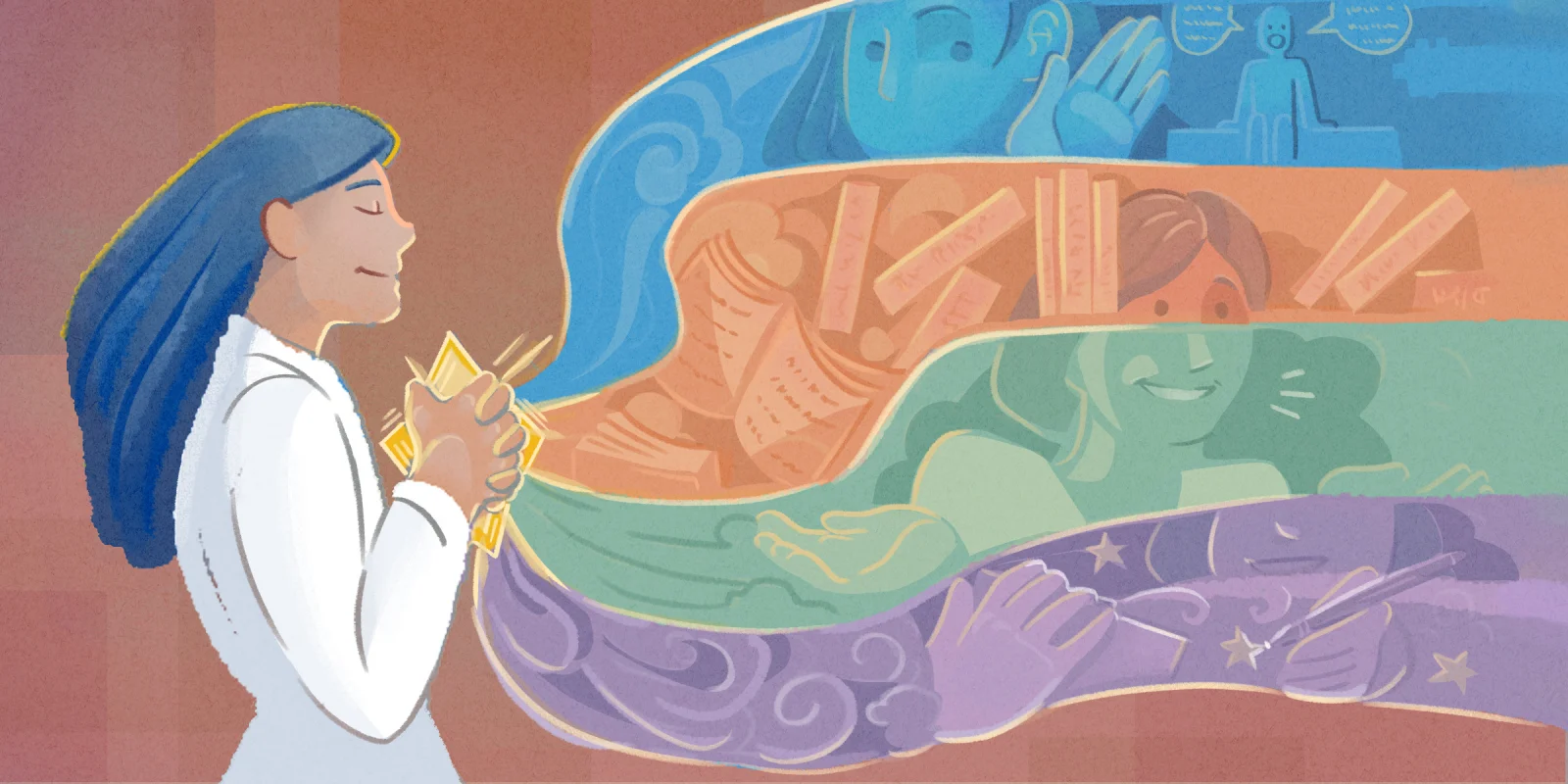My mission in life is not merely to survive, but to thrive; and to do so with some passion, some compassion, some humor, and some style. – Maya Angelou
I love Maya Angelou. Every time I read this quote, I am reminded of how I want to thrive as a clinician. As a clinician, it is so easy to get lost in the daily tasks of seeing patients in the clinic and the hospital, answering emails, sending in prescription refills, and dealing with problems with the EHR. Sometimes my work day just becomes a checklist of tasks to be completed and a list of patients to see. In times past, I often didn’t take the time to evaluate how I was doing as a clinician. Was I thriving or just surviving?
I learned how to define what thriving as an NP meant to me seven years ago, when on my way to work, I got into a car accident. I was driving about 40 mph and all of a sudden a blue Prius came out of nowhere to turn left and I had no choice but to slam on my brakes and collide with the oncoming car. My car was totaled, my airbags were deployed, and I was deaf and numb for a few seconds until I realized what had happened. Luckily, I only ended up with a concussion and a bruised chest. The elderly lady who ran into my car that day ended up OK too, even though she was taken away on a stretcher after the paramedics used the Jaws of Life to get her out of her totaled car. It was a really scary moment for me as I realized just how fast my life changed, and could have changed, in less than a second.
Although the accident gave me a concussion and caused me a lot of stress, surviving the crash made me feel lucky to be alive. I was given a renewed appreciation for life and it allowed me to re-examine my existence. It led me to question what it meant to feel alive in all aspects of my life, including my career. It was then that I realized how difficult it was to thrive in the world of medicine, when most of the time I felt like I was just surviving.
In gastroenterology, I recall being so stressed about having to see patients in the clinic and also do hospital consults and rounds. Switching back and forth throughout the day felt like a juggling act and I was always haunted by the worry that I wouldn’t have enough time to do everything. Once, I recall the heel of my shoe breaking as I ran from my car into the dialysis unit to be able to see a patient before she got off the dialysis machine. On these days, stress and anxiety fueled my day, and by the end of the day I felt tired and out of energy.
Although thriving felt impossible at times, I also started to see how it was possible. When I felt accomplished, happy, and inspired by the work I did, I felt I had a purpose and my day was meaningful. And I realized on those days that I thrived, I practiced with “some compassion, some passion, some humor, and some style.”
I learned that when feeling overwhelmed, I just needed to take a deep breath and remind myself of the reason why I became a clinician. When I decided to be an NP, I wanted to be able to help others and be of service. Once I connected with this sense of purpose, I immediately felt compassion. And this feeling of compassion overpowered the stress and anxiety I felt about my day. It helped me to focus on what the patient needed in that visit, to listen, and to empathize, so that I developed the best plan of care possible for what the patient came in for.
And I found that when I worked from a sense of purpose and compassion, I felt more passionate about my job. I was motivated to learn more about my speciality so that I could become a better clinician, and in turn provide better help and care to others. It translated to reading more about topics I was not familiar with. For example, in asthma and allergy, when I saw patients coming in with worsening cough and asthma during wildfire season, I started to read about the effects of climate change and its effects on asthma. In gastroenterology, I read about all the new conditions I encountered when doing hospital consults and became fascinated by what I learned. I eventually started to see work and patient encounters as adventures and a wonderful place to learn.
And when I felt more adventurous at work, I had more humor. If I saw that my schedule was full, I just laughed and told myself, “This day was going to be wild.” Having humor also brought lightheartedness to a job that sometimes felt so serious. For example, I’ve come across patients who have become upset about their diagnosis, or who don’t receive the test results they wanted, and they end up storming out of the office in frustration or anger. It is important to acknowledge how they are feeling, but to not take it personally.
In addition to having humor, having a sense of style could also bring a sense of freedom and creativity to a regular work day. To me, style means how we express ourselves in our work. Having worked with colleagues in different specialties, I learned we had different styles in the way we take patient histories and write them. My mentor in nephrology had her style of asking patients to bring all their medication bottles to their appointments rather than going by the medication list on file, so that she knew the exact medications they were taking at home. When taking patient histories, my style of communication was more easygoing. It helped me to stay relaxed and lively during the visits. Thus, style was really just about developing a system that worked best for me to help me get through the day.
There are many ways to thrive as clinicians and I am happy I found my framework to do so. Since then, I have made thriving one of my missions in life. Without becoming too self-critical, it’s important that we examine and evaluate ourselves as clinicians. Are we thriving or just surviving? Do we have some passion about what we do and if not, why not? Are there changes needed?
It should not take a car accident and a concussion to lead us to ask these questions. We spend the majority of our lives working, why would we not want to thrive while doing our work? I know that being a clinician is not easy and yes, there are days when it feels like we are just surviving and barely getting by. But I've found that simply having this mission to thrive can make such a big difference in my day.
What is your mission as a clinician? How are you doing on your mission? Share in the comments.
Joanne is a mother and NP from San Francisco, CA. She loves to write about the intersection of health, spirituality, feminism, and motherhood. A story's ability to inspire wisdom and self-reflection in others is what motivates her to write. She is a 2020–2021 Doximity Op-Med Fellow.
Illustration by April Brust






